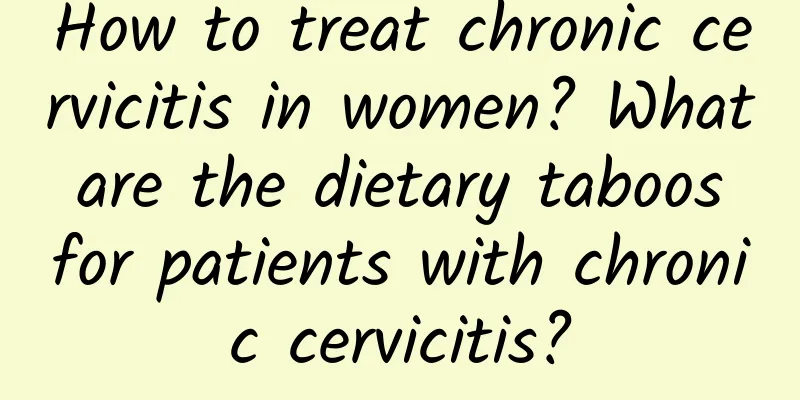What should you pay attention to in your diet after abortion? Three points should be paid attention to in your diet adjustment after abortion

|
Nowadays, more and more people are having abortions. Abortions are very harmful to the body, and the hormones in women's bodies will become disordered. Therefore, it takes a long time to recover after an abortion. So what should you pay attention to in your diet after an abortion? Let me introduce it to you today. Pay attention to a balanced diet, especially foods rich in protein and iron, such as eggs, lean meat, spinach, pork liver, etc. Secondly, be careful not to take tonic wine immediately, such as sesame oil chicken wine, ginseng, and angelica wine, which should be consumed after a week, because they may affect uterine contraction and increase bleeding problems. After artificial abortion, it is still necessary to make reasonable arrangements for the quantity, quality and combination of various foods to meet the body's needs for protein, carbohydrates, fats, vitamins, inorganic salts, water and cellulose. In order to promote recovery after artificial abortion, dietary adjustments should focus on the following points: (1) Protein is an important component of antibodies. If it is not taken in enough, the body's resistance will be reduced. Within half a month after artificial abortion, protein should be given at 1.5 to 2 grams per kilogram of body weight, and the daily amount is about 100 to 150 grams. Therefore, you can eat more chicken, lean pork, eggs, milk, beans, bean products, etc. 2) After artificial abortion, the body is weak and prone to sweating. Therefore, water should be replenished in small amounts and multiple times to reduce water evaporation; sweat excretes more water-soluble vitamins, especially vitamin C, vitamin B1, and vitamin B2, so you should eat more fresh vegetables and fruits. This is also helpful to prevent constipation. (3) On the basis of a normal diet, appropriate fat restriction should be applied. Fat intake should be controlled at about 80 grams per day within one week after surgery. People with menstrual disorders should avoid eating irritating foods, such as chili peppers, wine, vinegar, pepper, ginger, etc. These foods can stimulate congestion of the sexual organs and increase menstrual volume. Cold foods such as crabs, snails, and river clams should also be avoided. First of all, we must ensure the supply of high-quality protein, sufficient vitamins and inorganic salts, especially sufficient iron to prevent anemia. Food selection should be nutritious and easy to digest and absorb. Fresh fish, tender chicken, eggs, animal liver, animal blood, lean meat, soy products, milk, jujube, lotus seeds, fresh fruits and vegetables can be provided. Do not eat or eat less greasy raw and cold food, and do not eat radish, hawthorn, bitter melon, orange and other foods that have the properties of regulating qi, promoting blood circulation and cooling. Eat more easily digestible foods. The time for nourishing is preferably half a month. For those who are usually weak, have poor physical condition, and lose a lot of blood, the time for nourishing can be appropriately extended. |
Recommend
Dietary health knowledge for uterine fibroids
Uterine fibroids are a common gynecological tumor...
Experts briefly introduce several effective methods to relieve dysmenorrhea
Among various gynecological diseases, dysmenorrhe...
How to repair pelvic floor muscle uterine prolapse
Uterine prolapse refers to the descent of the ute...
Does exercising on an empty stomach help burn fat? Don't try these two types of people...
Does exercising on an empty stomach help burn fat...
Effective treatment for pelvic peritonitis
Pelvic peritonitis is a common gynecological dise...
Do you have back pain and difficulty burning calories at home to prevent the epidemic? Just 15 minutes of exercise at home every day to help you beat body fat
The Covid-19 epidemic is under continuous observa...
How to prevent cervical erosion and protect the cervix? Introduction to methods of preventing and checking cervical erosion
Cervical erosion is a common gynecological diseas...
What are the methods for treating cervical erosion?
What should we pay attention to when treating cer...
Check out the key points of preventing female adnexitis
For adnexitis, we must actively do a good job of ...
Can I eat durian after a miscarriage?
After miscarriage, women are generally weak, so t...
Hollywood actresses have a secret new weapon for losing weight! Avoid these three white foods to avoid obesity
Hollywood actress Jessica Alba has a hot body. Sh...
What are common uterine fibroids? Is it normal to have uterine fibroids?
What are common uterine fibroids? Is it normal to...
A cup of cocoa a day may reduce risk of dementia
According to statistical analysis, the top three ...
Is it good to boil water with mugwort to treat cervical erosion? These methods can also be used to treat cervical erosion
Mugwort is a traditional Chinese medicine. Becaus...
How much does a painless abortion cost in Hangzhou
How much does a painless abortion cost in Hangzho...









